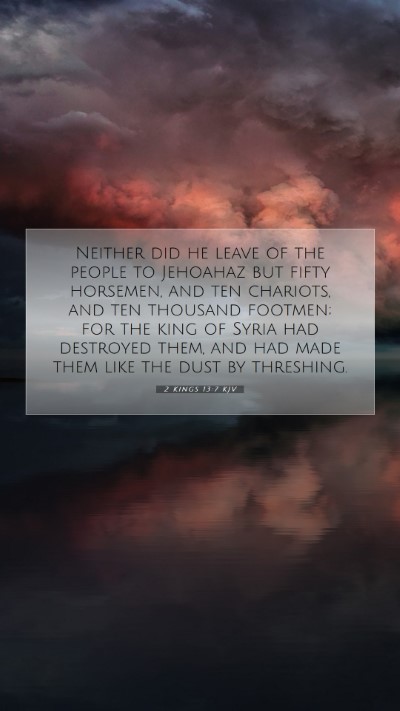Understanding 2 Kings 13:7 - A Comprehensive Commentary
In 2 Kings 13:7, we find a concise yet profound insight into the consequences of idolatry and spiritual decline in Israel. The verse states:
“For he left of the army to Jehoahaz but fifty horsemen, and ten chariots, and ten thousand footmen; for the king of Syria had destroyed them, and had made them like the dust by threshing.”
Overview of the Verse
This verse encapsulates the tragic situation of Israel during the reign of Jehoahaz. The King of Israel faced a significant military defeat against the Syrians, leading to a severely weakened army. This scripture serves not just as a historical account but also as a moral lesson about the spiritual state of the nation.
Insights from Public Domain Commentaries
-
Matthew Henry's Commentary:
Henry emphasizes the divine judgment upon Israel for their persistent idolatry and rejection of God. He points out that the limited military resources reflect not just physical loss, but also a spiritual impoverishment. The expression "made them like the dust by threshing" vividly illustrates their total defeat and loss of identity.
-
Albert Barnes' Notes:
Barnes expands on the significance of the numerical details. The reduced army size symbolizes the dire consequences of turning away from God. Barnes notes that the remnants of the army were minimal compared to what could have been if Israel had remained faithful. This reflects a larger theme of reliance on God versus reliance on military might.
-
Adam Clarke's Commentary:
Clarke highlights the geopolitical context of the era, explaining how Israel’s weakness was not only a result of military defeat but also a consequence of internal corruption and lack of leadership. Clarke notes that the verse serves as a reminder of the importance of righteousness in leadership and national strength.
Historical Context
The backdrop of this passage is significant. It falls within a period characterized by turmoil in Israel, where various kings led the nation during a time of repeated conflict. Understanding Scripture does not simply involve knowing what the text says, but also recognizing the historical implications and circumstances that led to such events.
Spiritual Implications
This verse can be interpreted as a broader metaphor for the consequences of sin and separation from God. In the modern context, believers may reflect on how turning away from spiritual truth can lead to decline in both personal and communal life. The application of Bible verses to daily life often involves finding parallels between biblical accounts and current experiences.
Bible Study Insights
For those engaging in Bible study groups or online Bible study, 2 Kings 13:7 offers fertile ground for discussion. It serves as a reminder to remain steadfast in faith and to assess how personal choices and collective behavior align with spiritual lessons from scripture.
Related Bible Verses
- 2 Kings 10:32-33: Discusses the decline of the house of Ahab and connects to the theme of judgment and retribution.
- 1 Chronicles 5:25: Illustrates the consequences of idolatry and how it led to Israel's weakening over time.
- Hosea 4:6: Highlights the importance of knowledge and the consequences of rejecting God’s word.
Conclusion
In conclusion, the verse 2 Kings 13:7 embodies a critical teaching on the importance of fidelity to God’s commandments and the grave repercussions that come with neglecting spiritual truths. For anyone seeking to dive deeper into Bible verse meanings or understanding difficult Bible passages, this verse serves as a pivotal moment in Israel's history, illustrating the intersection between faithfulness, divine judgment, and national strength.
In your journey of understanding Scripture, consider how the lessons from this passage apply to your own life, as well as the broader societal implications they may hold in today’s world. Engaging with scriptures through thorough exegesis and commentary can illuminate not only the text itself but also the principles that govern our lives as believers.


